Posted by
JCC Center for Loving Kindness on July 8, 2022
Welcome to our vision of community.
It will be a strong fabric made up of threads of love and support.
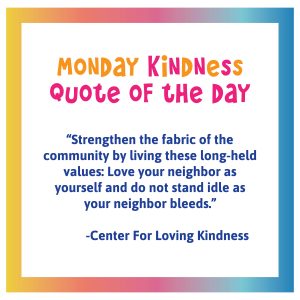 What do we mean when we say “love your neighbor as yourself”? How can we possibly love someone as much as ourselves? Isn’t that self-defeating? Rabbi Louis Jacobs (Jewish Personal and Social Ethics) teaches us that the meaning is not “love your neighbor like yourself”, but rather “love your neighbor because your neighbor is like you.” Your neighbor is a human being like you, with the same needs, the same hopes, the same right to be treated fairly.
What do we mean when we say “love your neighbor as yourself”? How can we possibly love someone as much as ourselves? Isn’t that self-defeating? Rabbi Louis Jacobs (Jewish Personal and Social Ethics) teaches us that the meaning is not “love your neighbor like yourself”, but rather “love your neighbor because your neighbor is like you.” Your neighbor is a human being like you, with the same needs, the same hopes, the same right to be treated fairly.
When have we seen our neighbors bleed? For some of us, this is a literal image of watching someone who is wounded. For most of us, it is figurative. In both cases, just as we would apply pressure to stop the bleeding of an open wound, we need to run to stop the bleed on our emotional, physical, educational, healthcare, well-being. Brene Brown gets it when she teaches, “Leadership is not about titles or the corner office. It’s about the willingness to step up, put yourself out there, and lean into courage. The world is desperate for braver leaders. It’s time for all of us to step up.” (Dare to Lead: Brave Work. Tough Conversations. Whole Hearts.) Here at the Center for Loving Kindness and Civic Engagement, we call this “Being an UPstander”.
Loving one another and standing up with each other are the two threads that will strengthen our community. Michael Brown writes, “Community is one of those things that is hard to define, but you know it when you are in it. It is a feeling that you are not alone, that you are part of something greater than yourself—but yet, even when you are in it, you are still yourself. It does not swallow you up; rather, it builds you up.” Michael Brown (Building Powerful Community Organizations: A Personal Guide to Creating Groups that can Solve Problems and Change The World)
This is why we are committed to strengthening the fabric of community.
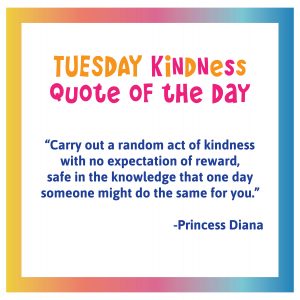 Princess Diana had it right. No matter one’s station in life, no matter wealth or race, religion or neighborhood, we have a responsibility to be kind to each other. For some, this responsibility is rooted in the concept that we are all created in God’s image. For others, it is rooted in common sense of decency. No matter the motivation, the outcome is the same: Be kind to your neighbor.
Princess Diana had it right. No matter one’s station in life, no matter wealth or race, religion or neighborhood, we have a responsibility to be kind to each other. For some, this responsibility is rooted in the concept that we are all created in God’s image. For others, it is rooted in common sense of decency. No matter the motivation, the outcome is the same: Be kind to your neighbor.
Moving beyond the “Golden Rule” in all of its varied articulations across history and religions, Diana is reminding us that kindness is about action not just sentiments. Back in the 16th and 17th centuries, Rabbi Isaiah Horowitz (1570-1626) taught: A day should not pass without acts of loving-kindness, either with one’s body, money, or soul. That 500-year-old wisdom is needed right here, right now. Just think of how many ways we need more kindness in our 21st century Pittsburgh. Think about it as you shop for groceries and the way you interact with the cashier. Think about it as you drive around your neighborhood and might be tempted to lean on your horn at a slower driver. Think about it as you make you way to social events and you talk with people who have different opinions than you.
It is as if Princess Diana and Rabbi Horowitz were fortune tellers who knew us better than we know ourselves.
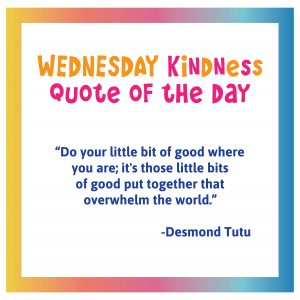
Let’s be real about how hard and overwhelming life feels right now. It seems like more than ever before we’re living with our guards up, our noses to the grindstone focused on ‘me and mine’, and that we’re keeping ourselves firmly planted in our corners where we’re surrounded with like-minded people. We might feel that it’s not within reach right now to do “little bits of good.” The thing is though, we’re not hard-wired for these survival mechanisms that sound reasonable on their surface.
Compassion, kindness, care, and concern are traits that are deeply and profoundly rooted deep within our DNA. Our species is so hard-wired for connection to others that practicing compassion and kindness actually reduces blood pressure, releases stress-reducing hormones, reduces anxiety and depression, and can even lower the effects of physical pain. It’s extraordinary to me that at the most fundamental level, we’re biologically equipped, and, even rewarded, to see each other’s humanity and to be concerned for each other.
South African Archbishop Desmond Tutu, who lived through the apartheid, knew first-hand about ways in which humans can be destructive and evil; we wouldn’t balk if Tutu wholly rejected the above claims to being hard-wired for kindness. It is especially remarkable that, despite the horrific state-sponsored oppression that countless Black South Africans suffered, he instead doubled-down on his belief that we are made for harmony and compassion. Even after coming of age in one of the most unkind, merciless environments, Tutu still insists that we are fundamentally made for kindness and goodness.
Tutu clarifies that kindness isn’t passive though. Kindness is active with thousands of small, but important, opportunities all around us where we already are when our eyes are open to it.
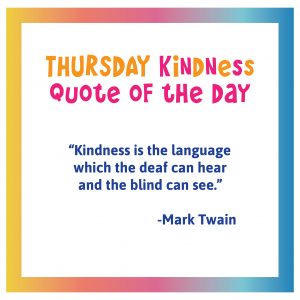 Can you think of another language that is as universal as kindness? Twain’s quote reminds us that we have needed kindness throughout the ages. Like whitewashing a dirty fence, kindness covers over the scars of the storms of our lives. Like love, it can be shared no matter the abilities the recipient possesses. Like love, it is ours to give.
Can you think of another language that is as universal as kindness? Twain’s quote reminds us that we have needed kindness throughout the ages. Like whitewashing a dirty fence, kindness covers over the scars of the storms of our lives. Like love, it can be shared no matter the abilities the recipient possesses. Like love, it is ours to give.
People who speak the language of kindness might agree with these statements:
- Others are just as important as me.
- All human beings are of equal worth.
- Having a warm and generous affect seems to bring reassurance and joy to others.
- Giving is more important than receiving.
- Doing good for others with love and kindness is the best way to live.
- I care for the ungrateful as well the grateful.
- I am not the center of the universe but part of a common humanity.
- People who are suffering need compassion.
- People in need require care.
- It is important to help everyone, not just family and friends.
Character Strengths and Virtues: A Handbook and Classification
—Christopher Peterson; Martin Seligman
Which of those statements are easiest for you to speak?
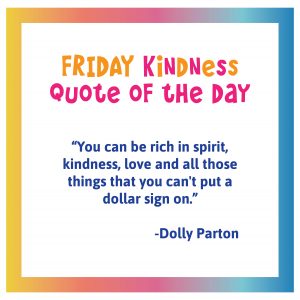
Dolly Parton earned her Practice Loving Kindness degree from the most prestigious institution, the school of hard knocks. We should all be students who take a lesson from her.
Parton is outspoken about how her family’s financial straits—she grew up dirt poor in a cabin with no running water—influenced her career decisions, her music, and especially her philosophy of life. She often shares with audiences that even though she was poor in an economic sense her family was rich. They instilled values in her of love, kindness, and compassion. Characteristics about how we encounter and accept each other and how we find meaning and purpose, that are far more valuable and enduring than money. She didn’t initially have a reason, therefore, to feel poor, or less human or ‘less valuable’ simply because of economic circumstances.
She didn’t know to be ashamed or to confront being different until she was ridiculed by her peers. She painfully sings about this in “Coat of Many Colors.” https://www.youtube.com/watch?v=c1zJzr-kWsI
